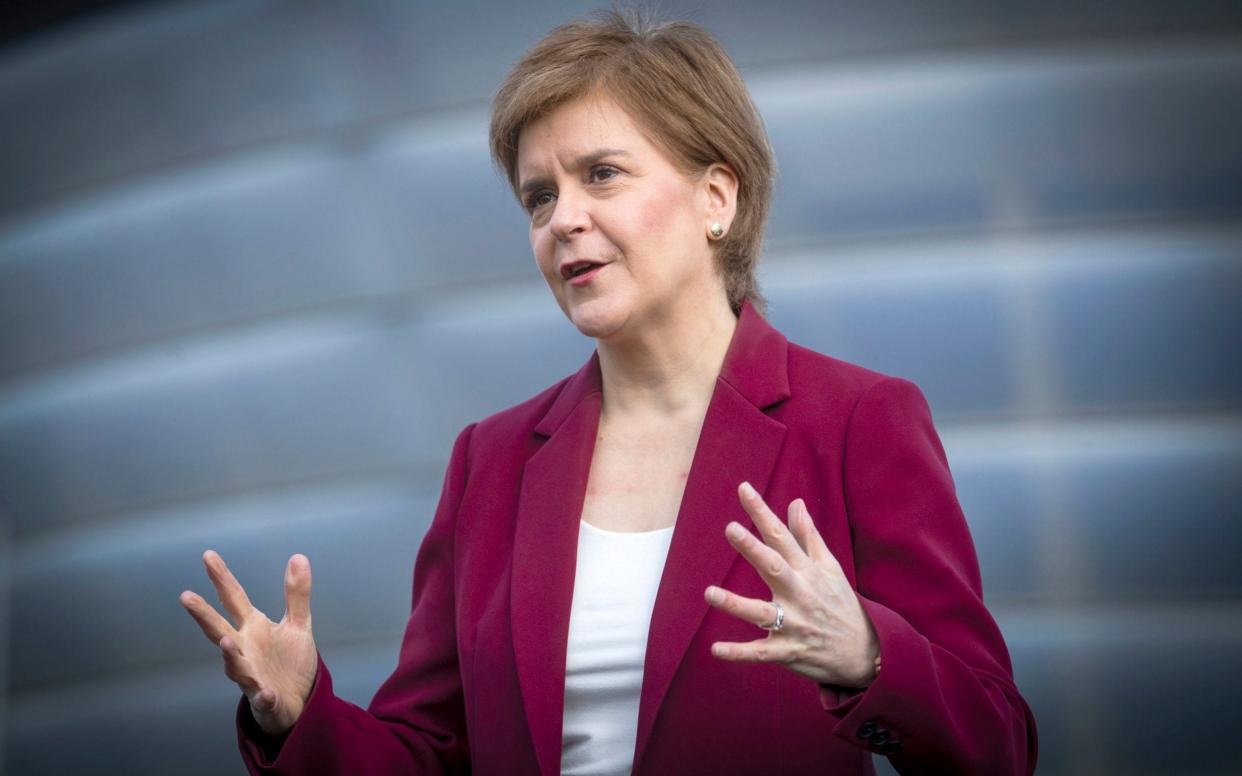Nicola Sturgeon pledges to increase NHS activity to pre-pandemic levels

- Oops!Something went wrong.Please try again later.
Half of all spending on frontline NHS care will go to GPs and community services if the SNP is re-elected in May, Nicola Sturgeon has pledged, as she outlined her pandemic recovery plan.
In a bid to reduce waiting times, the SNP leader also vowed to increase inpatient, outpatient and day-case treatment activity by ten per cent above pre-pandemic levels within the first year of the new parliament.
However, the First Minister’s pledges have been dismissed as “too little, too late” by opposition parties, who point out that the SNP has repeatedly failed to meet its own waiting time targets even before the pandemic.
As part of a “full-scale post-pandemic remobilisation of the NHS”, Ms Sturgeon promised that her party will set up an expanded network of 10 centres doing diagnostic work and elective surgery. This would include a renewed Edinburgh Eye Pavilion, as well new elective treatment centres in Ayrshire and Cumbernauld.
While work to establish the new centres is taking place, Ms Sturgeon said "mobile operating theatre units" will be deployed at a number of NHS sites.
📺 WATCH: @NicolaSturgeon’s speech on the NHS.
🏥 If re-elected, the SNP will massively increase elective and short-term hospital capacity across Scotland.
🗳 Don’t take any chances with our NHS in this election. Make it #BothVotesSNP by May 6.https://t.co/Xz4T40CZGl— The SNP (@theSNP) April 7, 2021
The health service could also utilise "under-used theatre capacity in community and general hospitals", she added, saying this could see more people treated as day cases.
In an online speech on Wednesday, she said the pandemic has "taught us never to take the NHS for granted", adding: "We need to value it, invest in it and protect it with everything we've got."
A key part of the SNP proposals would be working to ensure more people can "get the right support closer to their home", she said, and that a “real shift in the balance of care” is required from “acute hospital settings to community and local services”.
"I believe that working with our NHS staff, local communities, patient groups and trade unions, we can make sure people get the treatment they need, and that we can get Scotland's NHS not just back to where it was, but ready to serve Scotland long into the future,” she said.
Ms Sturgeon also promised to expand community mental health services “significantly”, and argued that investment in and reform of these services “was already a priority before the pandemic”.
However, opposition parties have blasted the SNP’s promises as “not credible” after 14 years of “mismanagement of the NHS”, as latest figures show that Scotland’s NHS is still operating at less than half its capacity a year on from the start of the pandemic.
Nicola Sturgeon’s government hasn’t met cancer waiting times in 9 years.
Covid didn’t cause this problem - it has made a bad situation worse.
That’s why we need to focus on recovery, with an NHS catch-up plan at its heart.https://t.co/OYkQhLo7of— Anas Sarwar (@AnasSarwar) March 12, 2021
At least 15,000 fewer routine operations were carried out in February compared with the same period last year, while the month also saw the second-lowest number of A&E patients seen within the government’s four-hour waiting time target.
SNP ministers have also previously come under fire for failing to meet the 62-day cancer waiting time target since 2012, with Scottish Labour warning last month that almost 45,000 Scots are now waiting more than the six-week standard for vital tests.
Scottish Labour health spokesperson Jackie Baillie said: “The SNP health pledge comes too little, too late. 14 years of the SNP government’s mismanagement of the NHS, and failure to address waiting times, has shown their commitments to patients are not credible.”
Ms Bailie pointed out that the SNP government has never met its waiting time standards for children’s mental health services, and have “breached their own waiting time law over 380,000 times”.
“These new assurances of investment and new targets won’t be worth much to people who have already been waiting years for operations or young people struggling on mental health waiting lists who all need help now,” she added.
Other parties have also made commitments to improve the health service in wake of the pandemic, with the Scottish Tories proposing a package of measures emphasising the importance of physical activity for good mental health and the need for increased funding to services.
The proposals include increasing the share of funding for mental health services by 10 per cent, reopening gyms immediately “to protect physical and mental health”, and investing £1m to support schools in opening their facilities to the public on weekends and week nights.
Meanwhile, Scottish Labour have pledged to install mental health workers in every GP practice and implement a catch-up plan for cancer screenings by increasing staff and processing capacity to clear the backlog of appointments.

